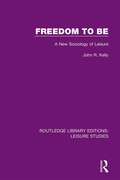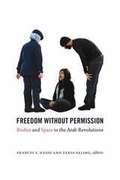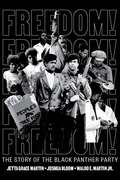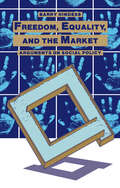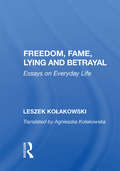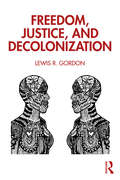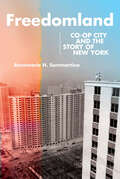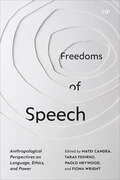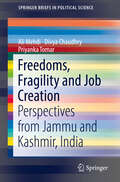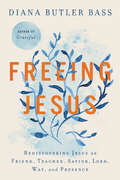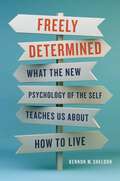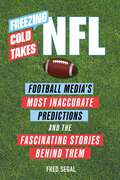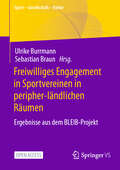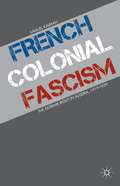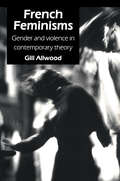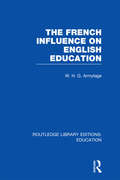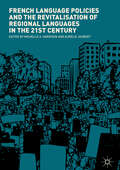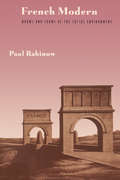- Table View
- List View
Freedom to Be: A New Sociology of Leisure (Routledge Library Editions: Leisure Studies #6)
by John R. KellyFirst published in 1987. Following an introductory chapter on the nature of theory and the outline of the book, there are eight chapters on the explanatory approaches, or models, employed in this dialectical analysis of the leisure industry. These models focus on particular elements of leisure: experience, decision, development, identities, interaction, institutions, political forces, and human definitions. With a new preface to the re-issue by the author, this title will be of great interest to students of Sociology and Leisure Studies.
Freedom without Permission: Bodies and Space in the Arab Revolutions
by Zakia Salime Frances S. HassoAs the 2011 uprisings in North Africa reverberated across the Middle East, a diverse cross section of women and girls publicly disputed gender and sexual norms in novel, unauthorized, and often shocking ways. In a series of case studies ranging from Tunisia's 14 January Revolution to the Taksim Gezi Park protests in Istanbul, the contributors to Freedom without Permission reveal the centrality of the intersections between body, gender, sexuality, and space to these groundbreaking events. Essays include discussions of the blogs written by young women in Egypt, the Women2Drive campaign in Saudi Arabia, the reintegration of women into the public sphere in Yemen, the sexualization of female protesters encamped at Bahrain's Pearl Roundabout, and the embodied, performative, and artistic spaces of Morocco's 20 February Movement. Conceiving of revolution as affective, embodied, spatialized, and aesthetic forms of upheaval and transgression, the contributors show how women activists imagined, inhabited, and deployed new spatial arrangements that undermined the public-private divisions of spaces, bodies, and social relations, continuously transforming them through symbolic and embodied transgressions. Contributors. Lamia Benyoussef, Susanne Dahlgren, Karina Eileraas, Susana Galan, Banu Gökariksel, Frances S. Hasso, Sonali Pahwa, Zakia Salime
Freedom! The Story of the Black Panther Party
by Joshua Bloom Jetta Grace Martin Waldo E. Martin Jr.Booklist Editors’ Choice WINNER of the Russell Freedman Award for Non-Fiction for a Better World Knowledge is power. The secret is this. Knowledge, applied at the right time and place, is more than power. It’s magic. That’s what the Black Panther Party did. They called up this magic and launched a revolution. In the beginning, it was a story like any other. It could have been yours and it could have been mine. But once it got going, it became more than any one person could have imagined. This is the story of Huey and Bobby. Eldridge and Kathleen. Elaine and Fred and Ericka. This is the story of the committed party members. Their supporters and allies. The Free Breakfast Program and the Ten Point Program. It’s about Black nationalism, Black radicalism, about Black people in America. From the authors of the acclaimed book, Black Against Empire: The History and Politics of the Black Panther Party, and introducing new talent Jetta Grace Martin, comes the story of the Panthers for younger readers—meticulously researched, thrillingly told, and filled with incredible photographs throughout. P R A I S E ★ "A passionate, honest, and intimate look into an important time in civil rights history." —Booklist (starred) ★ "Impeccable writing and stellar design make this title highly recommended." —School Library Journal (starred) "Detailed, thoroughly researched...A valuable addition to the history of African American resistance." —Kirkus
Freedom, Equality and the Market: Arguments on Social Policy
by Barry HindessThis new textbook for students of social theory considers the role of public intervention in social and economic processes. It is a clear, critical discussion of different theoretical and political perspectives on social policy. Barry Hindess begins with the ‘consensus’ view, shared by senior politicians, civil servants, and academics throughout much of the postwar period. This view depends on two beliefs: in the capacity of government to manage the economy; and in the development of a qualitatively new relationship between the state and the population. The first is discussed in relation to Crosland’s The Future of Socialism, and the second in relation to Marshall’s conception of citizenship and Titmuss’s account of social policy. The consensus view generated serious objections, and Hindess examines two in particular. One is the argument that the view itself causes a destructive, competitive struggle between sectional interests for state intervention in their favour. The other, from the left, is that what Tawney called ‘the strategy of equality’ has failed, and that a more radical attack on inequality is required. The remaining section looks at the Marxist and liberal alternatives to the consensus view. In conclusion, the author discusses firstly the essentialism of the market both in consensus and (in very different ways) in liberal and Marxist thought; and secondly the place of principles such as freedom and equality in political discussion and the analysis of social conditions. He shows that market and plan are not necessarily incompatible. Freedom, Equality, and the Market, with its careful assessment of the key texts, will be important reading for undergraduate students of sociology and social policy.
Freedom, Fame, Lying And Betrayal: Essays On Everyday Life
by Leszek KolakowskiPolish philosopher Leszek Kolakowski is renowned worldwide for wrestling with serious philosophical conundrums with dazzling elegance. In this new book, he turns his characteristic wit to important themes of ordinary life, from the need for freedom to the wheel of fortune, from the nature of God to the ambiguities of betrayal. Extremely lucid and l
Freedom, Justice, and Decolonization
by Lewis R. GordonThe eminent scholar Lewis R. Gordon offers a probing meditation on freedom, justice, and decolonization. What is there to be understood and done when it is evident that the search for justice, which dominates social and political philosophy of the North, is an insufficient approach for the achievements of dignity, freedom, liberation, and revolution? Gordon takes the reader on a journey as he interrogates a trail from colonized philosophy to re-imagining liberation and revolution to critical challenges raised by Afropessimism, theodicy, and looming catastrophe. He offers not forecast and foreclosure but instead an urgent call for dignifying and urgent acts of political commitment. Such movements take the form of examining what philosophy means in Africana philosophy, liberation in decolonial thought, and the decolonization of justice and normative life. Gordon issues a critique of the obstacles to cultivating emancipatory politics, challenging reductionist forms of thought that proffer harm and suffering as conditions of political appearance and the valorization of nonhuman being. He asserts instead emancipatory considerations for occluded forms of life and the irreplaceability of existence in the face of catastrophe and ruin, and he concludes, through a discussion with the Circassian philosopher and decolonial theorist, Madina Tlostanova, with the project of shifting the geography of reason.
Freedomland: Co-op City and the Story of New York
by Annemarie H. SammartinoIn Freedomland, Annemarie H. Sammartino tells Co-op City's story from the perspectives of those who built it and of the ordinary people who made their homes in this monument to imperfect liberal ideals of economic and social justice.Located on the grounds of the former Freedomland amusement park on the northeastern edge of the Bronx, Co-op City's 35 towers and 236 townhouses have been home to hundreds of thousands of New Yorkers and is an icon visible to all traveling on the east coast corridor. In 1965, Co-op City was planned as the largest middle-class housing development in the United States. It was intended as a solution to the problem of affordable housing in America's largest city. While Co-op City first appeared to be a huge success story for integrated, middle-class housing, tensions would lead its residents to organize the largest rent strike in American history. In 1975, a coalition of shareholders took on New York State and, against all odds, secured resident control. Much to the dismay of many denizens of the complex, even this achievement did not halt either rising costs or white flight. Nevertheless, after the challenges of the 1970s and 1980s, the cooperative achieved a hard-won stability as the twentieth century came to a close. Freedomland chronicles the tumultuous first quarter century of Co-op City's existence. Sammartino's narrative connects planning, economic, and political history and the history of race in America. The result is a new perspective on twentieth-century New York City.Annemarie H. Sammartino
Freedoms of Speech: Anthropological Perspectives on Language, Ethics, and Power (Studies in the Anthropology of Language, Sign, and Social Life)
by Fiona Wright Paolo Heywood Matei Candea Taras FedirkoBringing together leading anthropologists, this collection sheds light on the vast topic of freedoms of speech from a comparatively human perspective. Freedoms of Speech provides a sustained, empirical exploration of the variety of ways freedom of speech is lived, valued, and contested in practice; envisioned as an ideal; and mediated by various linguistic, ethical, and material forms. From Ireland to India, from Palestine to West Papua, from contemporary Java to early twentieth-century Britain, and from colonial Vietnam to the contemporary United States, the book broadly interrogates the classic vision of a singular “Western liberal tradition” of freedom of speech, exploring its internal complexities and highlighting alternative perspectives on the relationship between speech, freedom, and constraint in other times and places. Chapters analyse subjects commonly linked to freedom-of-speech debates, shedding new light on familiar topics that include campus speech codes, defamation, and press freedom, while also exploring unexpected ones such as therapy, gift-giving, and martyrdom. These analyses not only provide unexpected perspectives and unique insights but also address a myriad of questions, contributing to a rich, interdisciplinary, and human understanding of the nature of freedom of speech.
Freedoms, Fragility and Job Creation: Perspectives From Jammu And Kashmir, India (SpringerBriefs in Political Science)
by Ali Mehdi Divya Chaudhry Priyanka TomarThis book argues that inequality of basic freedoms—economic, political, sociocultural—is a central cause of fragility and challenge to job creation in fragile geopolitical situations. It is based on extensive official data and stakeholder interactions in the conflict-ridden Indian border state of Jammu and Kashmir, and involves a case study research methodology. This is the first book which invokes the philosophical perspective of freedom to analyze two of the most pressing challenges of our time—fragility and job creation—and, as such, makes a fundamental contribution to both strands of academic and policy literature. From this perspective, development in the sense of freedoms—particularly the enhancement of human agency through jobs—should be a central strategy in tackling fragility. Most literature on Indian Kashmir has been emotional or political in nature, lacking the serious yet interesting multidisciplinary focus presented here—which is a historical assessment of Kashmir’s political economy, economic indices, employment patterns, challenges of infrastructure and human capital. Ending with a set of long-, medium- and immediate-term policy recommendations to address the challenge of jobs in the state, this is the only book on Indian Kashmir which is at once philosophical, social-scientific and policy-oriented in nature. Academics in development studies, regional development, political science and international relations, international organizations working in fragile regions around the world, national and international policymakers, the private sector, civil society, media as well as ordinary readers interested in the issue of Kashmir will find it engaging and useful.
Freeing Jesus: Rediscovering Jesus as Friend, Teacher, Savior, Lord, Way, and Presence
by Diana Butler BassThe award-winning author of Grateful goes beyond the culture wars to offer a refreshing take on the comprehensive, multi-faceted nature of Jesus, keeping his teachings relevant and alive in our daily lives."How can you still be a Christian?" This is the most common question Diana Butler Bass is asked today. It is a question that many believers ponder as they wrestle with disappointment and disillusionment in their church and its leadership But while many Christians have left their churches, they cannot leave their faith behind. In Freeing Jesus, Bass challenges the idea that Jesus can only be understood in static, one-dimensional ways and asks us to instead consider a life where Jesus grows with us and helps us through life’s challenges in several capacities: as Friend, Teacher, Savior, Lord, Way, and Presence. Freeing Jesus is an invitation to leave the religious wars behind and rediscover Jesus in all his many manifestations, to experience Jesus beyond the narrow confines we have built around him. It renews our hope in faith and worship at a time when we need it most.
Freely Determined: What the New Psychology of the Self Teaches Us About How to Live
by Kennon M SheldonA renowned psychologist argues that free will is not only real but essential to our well-being It&’s become fashionable to argue that free will is a fiction: that we humans are in the thrall of animal urges and unconscious biases and only think that we are choosing freely. In Freely Determined, research psychologist Kennon Sheldon argues that this perception is not only wrong but also dangerous. Drawing on decades of his own groundbreaking empirical research into motivation and goal setting, Sheldon shows us that embracing the ability to choose our path in life makes us happier, healthier, and more fulfilled. He also shows that this insight can help us choose better goals—ones that are concordant with our values and that, critically, we&’re more likely to actually see through. Providing readers insight into how they can live a more self-directed, satisfying life, Freely Determined offers an essential guide for how we might recognize our freedom and use it wisely.
Freethinkers: A History of American Secularism
by Susan JacobyHow secularists view the world and how they are viewed by others.
Freethought and Atheism in Central and Eastern Europe: The Development of Secularity and Non-Religion (Routledge Studies in Religion)
This book provides the first comprehensive overview of atheism, secularity and non-religion in Central and Eastern Europe in the twentieth and twenty-first centuries. In contrast to scholarship that has focused on the ‘decline of religion’ and secularization theory, the book builds upon recent trends to focus on the ‘rise of non-religion’ itself. While the label of ‘post-communism’ might suggest a generalized perception of the region, this survey reveals that the precise developments in each country before, after and even during the communist era are surprisingly diverse. A multinational team of contributors provide interdisciplinary case studies covering Estonia, Latvia, Lithuania, Russia, Ukraine, Poland, the Czech Republic, Slovakia, Hungary, Croatia, Romania and Bulgaria. This approach utilises perspectives from social and intellectual history in combination with sociology of religion in order to cover the historical development of secularity and secular thought, complemented with sociological data. The study is framed by methodological and analytical chapters. Offering an important geographical perspective to the study of freethought, atheism, secularity and non-religion, this wide-ranging book will be of significant interest to scholars of twentieth-century social and intellectual history, sociology of religion and non-religion, cultural and religious studies, philosophy and theology.
Freezing Cold Takes: Football Media’s Most Inaccurate Predictions—and the Fascinating Stories Behind Them
by Fred SegalSports fans love holding media "experts" accountable for bad predictions.Since 2015, Fred Segal has chronicled &“unprophetic&” sports predictions on the internet. His Freezing Cold Takes social media pages feature quotes and predictions from members of the sports world that have aged poorly or were, in hindsight, flat-out wrong. The pages have become a guilty pleasure for hundreds of thousands of sports fans who love to see (okay, and mock in good humor) sports media&’s infamous &“hot takes&” that went cold. With this book, Segal focuses on the NFL, and provides a vast collection of poorly aged predictions and analysis from NFL media members and personalities about some of the most famous teams and players in the league&’s history. He also explores ill-fated commentary related to draft picks, hiring decisions, and some of the NFL&’s most notable games. But this book is not simply a list of quotes. It delves through content mined from internet archives and original interviews with media, players, and coaches. Segal provides important background surrounding each featured mistake to offer essential context as to why the ill-fated prediction was made as well as why the personality who made the prediction is eating their words.Together, the fourteen chapters—each spotlighting Freezing Cold Takes about a specific team or topic within a certain defined period—create a wholly unique and endlessly entertaining lens through which to explore NFL history. A few illustrative examples:(1987-94 San Francisco 49ers): &“The 49ers should do everyone a favor. Trade Steve Young. The myth. And the man.&”(1989-93 Dallas Cowboys): &“The Vikings fleeced the Cowboys to get Herschel Walker&”(2000 New England Patriots): "The Patriots will regret hiring Bill Belichick"(2008 Green Bay Packers): "Brian Brohm has more upside than Aaron Rodgers"(NFL Draft Picks): &“The Dolphins could have had their next Dan Marino if they selected Brady Quinn&” (2007)
Freezing Fertility: Oocyte Cryopreservation and the Gender Politics of Aging (Biopolitics #22)
by Lucy van de WielWelcomed as liberation and dismissed as exploitation, egg freezing (oocyte cryopreservation) has rapidly become one of the most widely-discussed and influential new reproductive technologies of this century. In Freezing Fertility, Lucy van de Wiel takes us inside the world of fertility preservation—with its egg freezing parties, contested age limits, proactive anticipations and equity investments—and shows how the popularization of egg freezing has profound consequences for the way in which female fertility and reproductive aging are understood, commercialized and politicized.Beyond an individual reproductive choice for people who may want to have children later in life, Freezing Fertility explores how the rise of egg freezing also reveals broader cultural, political and economic negotiations about reproductive politics, gender inequities, age normativities and the financialization of healthcare. Van de Wiel investigates these issues by analyzing a wide range of sources—varying from sparkly online platforms to heart-breaking court cases and intimate autobiographical accounts—that are emblematic of each stage of the egg freezing procedure. By following the egg’s journey, Freezing Fertility examines how contemporary egg freezing practices both reflect broader social, regulatory and economic power asymmetries and repoliticize fertility and aging in ways that affect the public at large. In doing so, the book explores how the possibility of egg freezing shifts our relation to the beginning and end of life.
Freie in Lokalredaktionen: Merkmale, Tätigkeitsfelder und organisationale Einbindung
by Wiebke Möhring Anna-Lena WagnerIm Fokus dieser Studie stehen haupt- und nebenberufliche freie Mitarbeiter:innen in Lokalredaktionen von Tageszeitungen und ihren Onlineablegern. Eingesetzt wird ein Mehrmethodenansatz von qualitativen und quantitativen Befragungen, die auf einem sozialintegrativen Theoriemodell basieren. In dem vorliegenden Buch werden die Ergebnisse dieser Befragungen aus Akteurs- und Redaktionsperspektive systematisiert und vorgestellt. Im Zentrum stehen so unter anderem die journalistischen Qualifikationen der Freien, ihre Beziehung zur Lokalredaktion und zur lokalen Umwelt, redaktionelle Richtlinien und Qualitätssicherungsmaßnahmen.
Freiheit und Landschaft: Auf der Suche nach Lebenschancen mit Ralf Dahrendorf (RaumFragen: Stadt – Region – Landschaft)
by Olaf Kühne Corinna Jenal Karsten Berr Kai SchusterDas Buch befasst sich mit Fragen der Operationalisierung des Lebenschancen-Ansatzes von Ralf Dahrendorf in Bezug auf räumliche Entwicklungen. Dabei wird untersucht, welche Raumentwicklungen zu einer Maximierung von Lebenschancen beitragen können und welche Raumentwicklungen mit dem Ziel der Maximierung von Lebenschancen zu erstreben sind. Die auf der Idee der Maximierung von Lebenschancen ausgerichtete Raumentwicklung wird dabei an alternativen Weltanschauungen – wie dem klassischen Liberalismus, dem Konservatismus und dem Sozialismus – reflektiert. Der auf die Maximierung von Lebenschancen gerichtete Ansatz der Raumentwicklung wird anhand unterschiedlicher aktueller Herausforderungen exemplarisch dargestellt, etwa der Moralisierung von räumlichen Entwicklungen, der Energiewende, der Kommunikation von Räumen im Internet, Klimawandel und Protesten. Abschließend wird ein Ansatz eines Umgangs mit Raum aus der Perspektive eines Lebenschancen maximierenden Liberalismus erarbeitet.
Freiwilligenarbeit: Motivation, Gestaltung Und Organisation (essentials)
by Theo Wehner Stefan T. Güntert Harald A. MiegDie Autoren erörtern in diesem essential die wesentlichen Punkte für das Verständnis und die Organisation von Freiwilligenarbeit. Sie beschäftigen sich mit den folgenden Fragen: Wie können wir freiwillige Arbeit verstehen? Wie wesentlich ist es für diese Art von Arbeit, dass sie unbezahlt bleibt und von sogenannten Laien mit besonderer Motivlage ausgeführt wird? Was folgt daraus für das Zusammenspiel von Freiwilligenarbeit und der professionalisierten, bezahlten Erwerbsarbeit? Diese Fragen werden zunehmend gestellt, denn ohne die unbezahlten Tätigkeiten von Freiwilligen kann kein derzeitiges Gemeinwesen bestehen.
Freiwilliges Engagement in Sportvereinen in peripher-ländlichen Räumen: Ergebnisse aus dem BLEIB-Projekt (Sport – Gesellschaft – Kultur)
by Sebastian Braun Ulrike BurrmannDas Ziel des BLEIB-Projekts bestand darin, sozialräumliche, organisationale und individuelle Rahmenbedingungen zu analysieren, die ein ehrenamtliches und freiwilliges Engagement in Sportvereinen ausgewählter peripher-ländlicher Räume in Ostdeutschland bedingen, restringieren und befördern. Um diese Zielstellung empirisch zu untersuchen, wurde eine Sekundäranalyse der Freiwilligensurveys 2014 und 2019 vorgenommen, standardisierte Vereins- und Mitgliederbefragungen in ca. 40 Sportvereinen durchgeführt sowie über 30 Gruppendiskussionen in Sportvereinen realisiert. Dies ist ein Open-Access-Buch.
French Colonial Fascism
by Samuel KalmanAlarmed by a growing Muslim population and a reputedly weak imperial administration, European settlers in Algeria in the early twentieth century increasingly turned to fascism in order to seize power and create an authoritarian regime. This study investigates the extreme-rightist leagues that arose in this context, with particular attention to the rabid xenophobia directed at local Jews and Muslims, who were derisively branded 'indigenes' and cast as anti-colonial and left-wing actors. In their attempts to preserve European hegemony and a subjugated pool of unskilled labor, these groups helped to cement a clear racial hierarchy and definitively shaped Algeria's colonial history. "
French Feminisms: Gender And Violence In Contemporary Theory (Gender, Change, And Society Ser.)
by Gill AllwoodIn this text, Gill Allwood explores theories of masculinity emerging from French feminist theories of gender and from French feminist practice concerning violence towards women, highlighting both the commonalities and the specificities of the French case. She discusses the particular concern of French theorists with seduction, their rejection of the term "gender" and the centrality of the difference debate.; In the first part of the book, Allwood separately examines feminist theories of gender and sexual difference and the problem of male violence. She goes on to consider the developments which are taking place on the borderline between the two, examining the way in which these developments have contributed to an understanding of masculinity. Readdressing problems and debates that will be familiar to English-speaking readers, the text exposes cultural differences and similarities in the ways in which these problems are approached and it provides a detailed account of the changes in both feminist action and theory in France in recent years.; This analysis of feminism in France should be of interest to student and scholars in French studies, European studies, gender studies and cultural studies.
French Household Cookery: With A Number Of Recipes From The Best Paris Chefs, Simple And Inexpensive
by KeyzerFirst published in 2006. Routledge is an imprint of Taylor & Francis, an informa company.
French Influence on English Education (Routledge Library Editions: Education)
by W H ArmytageIn this volume the author discusses the influence of France from the Norman invasion to the late 1960s. French thought and ideas are examined and more tangible evidence is also given of the widespread and often unnoticed influence that France has exerted on English education.
French Language Policies and the Revitalisation of Regional Languages in the 21st Century
by Michelle A. Harrison Aurélie JoubertThis edited volume presents an analysis of the evolution of French language policies and their impact on French regional languages and their communities. It gathers studies on language revitalisation from several territorial minority languages (Breton, Alsatian, Catalan, Occitan, Basque, Corsican, Francoprovençal, Picard, Reunionese) and evaluates the challenges and opportunities that they face in the 21st century. The chapters tackle different aspects of language endangerment and language planning and adopt varied theoretical and methodological approaches. The first section of the book reconsiders the difficulties in establishing linguistic boundaries and classification for some regional languages. The second section examines the important theme of the new generation of speakers with issues of transmission and identity formation and the changes they can bring to traditional communities. The third section highlights new developments in the context of new technologies and the heightened visibility of regional languages. Finally, the last section presents an overview of the contemporary situation of minority language revitalisation in France and synthesises the key trends identified in this volume: from the educational domain to the European Charter for Minority and Regional languages. This book will appeal to students and scholars of the sociology of language, sociolinguistics, language policy, minority languages and language endangerment.
French Modern: Norms and Forms of the Social Environment
by Paul RabinowIn this study of space and power and knowledge in France from the 1830s through the 1930s, Rabinow uses the tools of anthropology, philosophy, and cultural criticism to examine how social environment was perceived and described. Ranging from epidemiology to the layout of colonial cities, he shows how modernity was revealed in urban planning, architecture, health and welfare administration, and social legislation.
